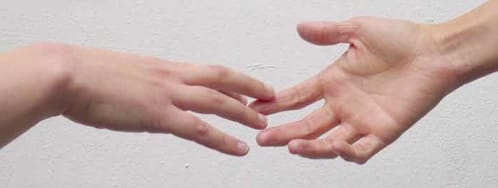IF YOU KNEW
What if you knew you’d be the last
to touch someone?
If you were taking tickets, for example,
at the theater, tearing them,
giving back the ragged stubs,
you might take care to touch that palm,
brush your fingertips
along the life line’s crease.
When a man pulls his wheeled suitcase
too slowly through the airport,
when the car in front of me doesn’t signal,
when the clerk at the pharmacy
won’t say Thank you, I don’t remember
they’re going to die.
A friend told me she’d been with her aunt.
They’d just had lunch and the waiter,
a young gay man with plum black eyes,
joked as he served the coffee,
kissed her aunt’s powdered cheek when they left.
Then they walked half a block and her aunt
dropped dead on the sidewalk.
How close does the dragon’s spume
have to come? How wide does the crack
in heaven have to split?
What would people look like
if we could see them as they are,
soaked in honey, stung and swollen,
reckless, pinned against time?
One Of the many wonderful things about a poem is that you can pour everything into it—joy and sorrow, the remarkable and the ordinary—and the poem will use all of it, turning stones into bread along the way. In this poem, If You Knew, even a man wheeling his suitcase through an airport and the clerk in the pharmacy who won’t say Thank you come newly alive for us when we remember that they, like us, are drifting toward an irrevocable finality. Ellen Bass is affirming that we are most alive when we are aware of the shadow of death that hovers over everything, perhaps especially over ourselves. It is our mortality that makes life so precious.
Imagine looking at yourself in the mirror, or at your lover or your parents, and seeing you or them soaked in honey, stung and swollen. How forgiving your look would become—the lines in your face would soften in the glow of the truth before you. In this one image, Bass joins our beauty to our wounding.
And our greatest wounding—the imperfection that no amount of prayer or goodness or psychotherapy will ever do anything to erase—is that we are pinned against time. Time is both our friend and our ultimate demise. It is our friend when we awaken to the reality that this life will not always be so. When we know this from the inside, the caution that may have colored our days will dissolve like mist over the bay. With nothing to lose, knowing there can be nothing to hold on to, we can fall headlong into life at last. We can be reckless, like butterflies still hovering over a flower even as the collector leans forward with his net.
Far from being a tragedy, there is something poignantly wondrous about our mortal predicament. I wish only that I might live out my days like this, in wonder.
